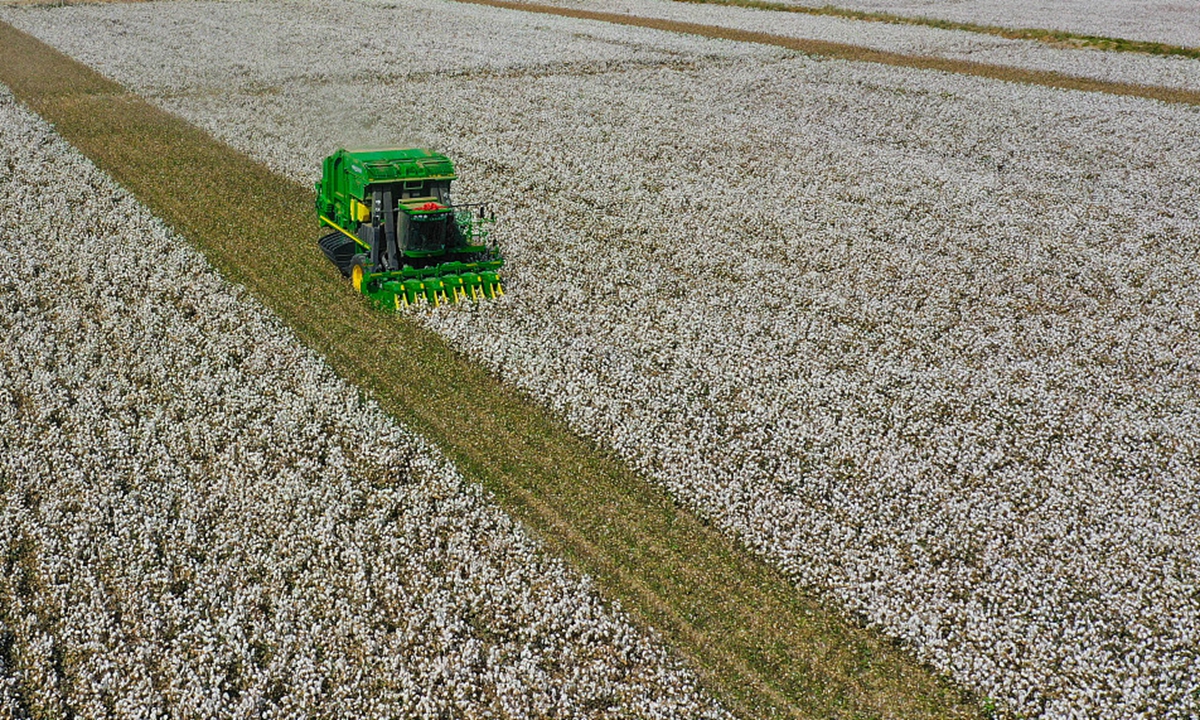Chinese cotton industry launches program to counter Western crackdown on Xinjiang exports
New program to counter foreign crackdown

Xinjiang cotton Photo: VCG
The China Cotton Association (CCA), along with other industry organizations, officially launched the Cotton China Sustainable Development Program on Thursday, aiming to build a homegrown independent sustainable standard and certification system to counter the West's dominance that has posed serious threat on China's cotton industry.
The move marks a milestone in overhauling the global cotton rule-making system, which is currently monopolized by the Better Cotton Initiative (BCI), a West-led industry body that has apparently been manipulated by some anti-China forces in their slandering against China and its policies in Northwest China's Xinjiang Uygur Autonomous Region.
BCI suspended cotton licenses for Xinjiang companies several months ago, which led to a sharp plunge in the region's cotton exports after boycotts by several global fashion brands.
Industry insiders said that the establishment of the new program will make China - the world's largest cotton consumer market - hold a significant saying in international pricing and standard-setting, and more importantly, lend it a tool to reasonably defend itself and protect its legitimate interests against Western political crackdowns.
The program is designed to promote the high-quality and sustainable development of China's cotton industry based on the core concept of "environmental friendly, excellent quality, respect for labor and fully traceable." It will facilitate the consumption of homegrown cotton and expand the global market share of Chinese cotton.
Preparation for the program had begun for a while before it was launched on Thursday at the 2021 China International Cotton Conference in Suzhou, East China's Jiangsu Province.
So far, it has finished formulating standards for the management of cotton production and signed contracts with six Chinese cotton producers. Looking ahead, it will further cooperate with the textile supply chain and brands to build a sustainable cotton industrial chain from production, textile and clothes manufacturing, to brand sales.
Gao Fang, chairman of the CCA, said at the opening ceremony that under the program, the CCA will also commence evaluation work on cotton producers, and push forward the mutual recognition between Chinese standards and international standards. Also, a traceable system will be set up to supervise the whole supply chain.
"We had already begun the work, but the BCI's [license suspension in April] further raised the urgency and sped up the process. All industry bodies have been uniting to help promote Chinese cotton, to make us less constrained by [other nations]," Wang Jiandong, vice chairman and secretary general of the CCA, told the Global Times on the sideline of the conference on Thursday.
"Why does the BCI's license have such a global influence? And why China - as the world's largest cotton consumption country and the world's second-largest cotton producer - has a limited saying in trade practices in international sphere? We should reverse this situation," Wang said.
Industry insiders noted that the ultimate goal of the program is to challenge the BCI's rules, reduce reliance on Western standards, and promote the China-developed sustainable cotton standard in the world, while also raising global brand awareness for China-made textile and clothing.
The BCI is the largest cotton sustainability program in the world. At the end of 2019, it had more than 1,840 members, spanning the entire global cotton supply chain.
In 2019, BCI Retailer and Brand Members sourced more than 1.5 million metric tons of Better Cotton, including brands such as H&M, Adidas, and Nike. When the BCI stopped issuing licenses for Xinjiang cotton based on the widely debunked claim of "forced labor," these multinational firms followed suit.
An industry insider, who spoke on the condition of anonymity, told the Global Times on the sideline of the conference on Thursday that the ban was equivalent to excluding 80 percent of Chinese cotton and 20 percent of global cotton from some of the world's supply chain.
Xinjiang is China's largest cotton production base, with an annual output of around 5 million tons.
"The BCI could also manipulate cotton price through inventory, purchase delivery time and financial leverage, which are common practices in bulk commodity trading. Such price fluctuations would also affect the revenue of domestic companies across the supply chain," the insider said.
But on a positive side, Wang noted that while the US has long dominated the setting of global cotton prices, China is also gradually gaining global influence as cotton future market at home improves.
At the conference, participants also brushed off some Western countries' slander against Xinjiang cotton over unsubstantiated human rights allegations, criticizing NGOs and Western economies for using political agenda to disrupt the global supply chain in the cotton industry and hurt the interests of Xinjiang cotton farmers and global consumers.
"We strongly object politicizing economic issues. The world needs to join hands to maintain a free, open and non-discriminatory multilateral trade mechanism," Wang Wei, an official at the All China Federation of Supply and Marketing Cooperatives, said at the opening ceremony of the conference on Thursday.



